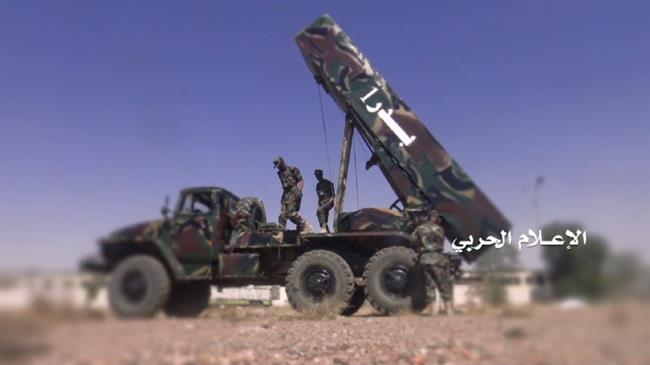Yemeni army forces, supported by allied fighters from Popular Committees, have fired a domestically-designed and -developed ballistic missile at a strategic economic target in Saudi Arabia’s southwestern border region of Jizan in retaliation for the Riyadh regime’s devastating military aggression against their impoverished country.
A Yemeni military source, speaking on condition of anonymity, told Arabic-language al-Masirah television network that the short-range Badr-1 missile struck an oil refinery of the Saudi Arabian national petroleum and natural gas company, Aramco, in the region, located 967 kilometers southwest of the capital Riyadh, with great precision, on Friday evening.

Earlier in the day, Yemeni troopers and their allies had attacked a command center of Emirati military forces in the country’s western coastal province of Hudaydah, using a domestically-built long-endurance unmanned aerial vehicle.
There were no immediate reports about possible casualties and the extent of damage caused at the site.

Separately, a Saudi-led Boeing AH-64 Apache attack helicopter crashed in Yemen’s eastern province of Mahra.
An official of Provincial Supreme Security Committee, who asked to remain anonymous, said, “The Saudi-led helicopter crashed while conducting a reconnaissance mission over Tanhala Mountains.”
He confirmed that the Saudi pilot and his assistant died as a result of the helicopter crash caused by unknown reasons.
Saudi media outlets later identified the pair as Captain Saud bin Nasser bin Jaris and First Lieutenant Ahmed bin Abdulaziz al-Dabian.
Moreover, eight civilians lost their lives when Saudi warplanes bombarded Kilo 16 area in the al-Hali district of Hudaydah province.
Later in the day, Saudi fighter jets struck Yemeni fishing boats in waters off the Seven Brothers Islands, also known as the Sawabi Islands or Seba Islands, in the Bab el-Mandeb Strait, killing two people and injuring another.
Yemeni sources say the fate of the fourth fisherman remains unknown after the airstrike.

Saudi Arabia and a number of its regional allies launched a devastating military campaign against Yemen in March 2015, with the aim of bringing the government of former president Abd Rabbuh Mansur Hadi back to power and crushing the country’s Houthi Ansarullah movement.
Some 15,000 Yemenis have been killed and thousands more injured since the onset of the Saudi-led aggression.
More than 2,200 others have died of cholera, and the crisis has triggered what the United Nations has described as the world's worst humanitarian disaster.
